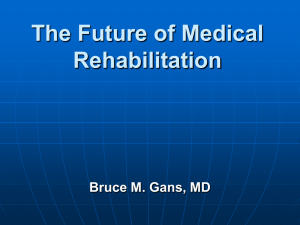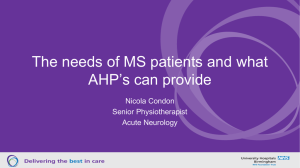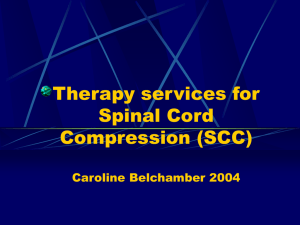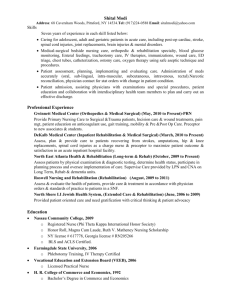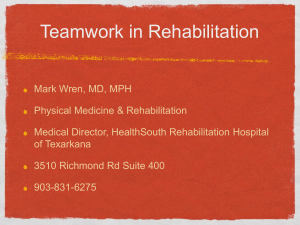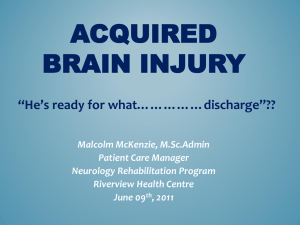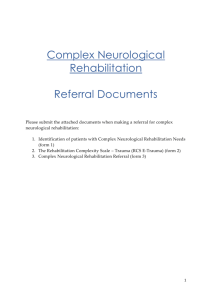National Clinical Audit of Specialist Rehabilitation for
advertisement
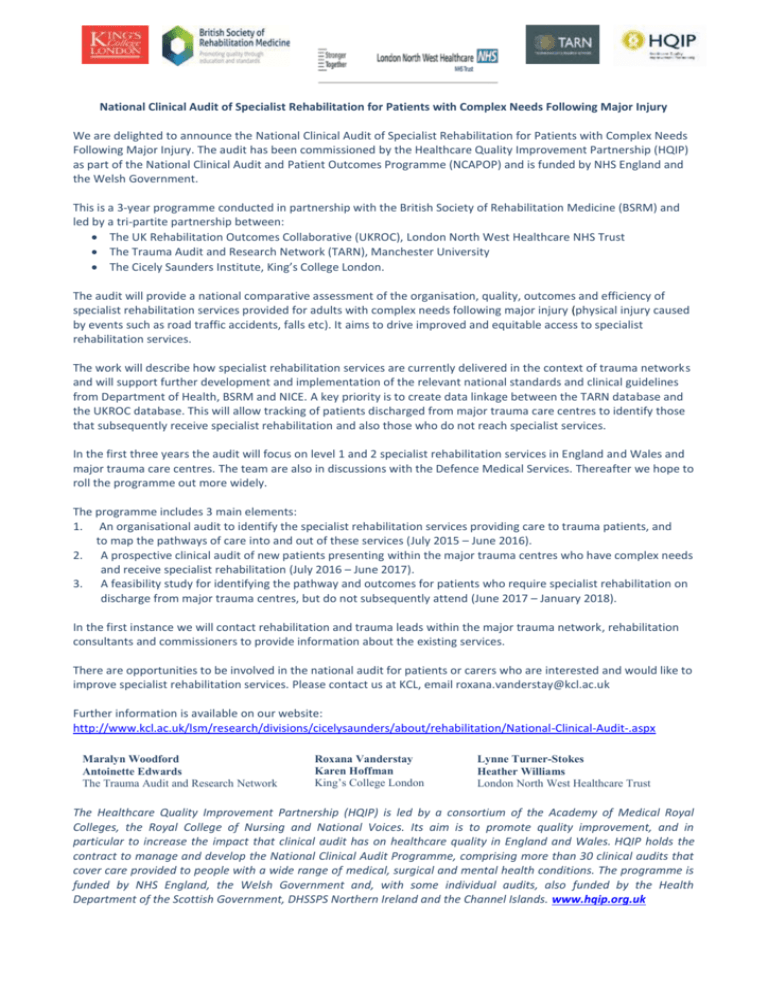
National Clinical Audit of Specialist Rehabilitation for Patients with Complex Needs Following Major Injury We are delighted to announce the National Clinical Audit of Specialist Rehabilitation for Patients with Complex Needs Following Major Injury. The audit has been commissioned by the Healthcare Quality Improvement Partnership (HQIP) as part of the National Clinical Audit and Patient Outcomes Programme (NCAPOP) and is funded by NHS England and the Welsh Government. This is a 3-year programme conducted in partnership with the British Society of Rehabilitation Medicine (BSRM) and led by a tri-partite partnership between: The UK Rehabilitation Outcomes Collaborative (UKROC), London North West Healthcare NHS Trust The Trauma Audit and Research Network (TARN), Manchester University The Cicely Saunders Institute, King’s College London. The audit will provide a national comparative assessment of the organisation, quality, outcomes and efficiency of specialist rehabilitation services provided for adults with complex needs following major injury (physical injury caused by events such as road traffic accidents, falls etc). It aims to drive improved and equitable access to specialist rehabilitation services. The work will describe how specialist rehabilitation services are currently delivered in the context of trauma networks and will support further development and implementation of the relevant national standards and clinical guidelines from Department of Health, BSRM and NICE. A key priority is to create data linkage between the TARN database and the UKROC database. This will allow tracking of patients discharged from major trauma care centres to identify those that subsequently receive specialist rehabilitation and also those who do not reach specialist services. In the first three years the audit will focus on level 1 and 2 specialist rehabilitation services in England and Wales and major trauma care centres. The team are also in discussions with the Defence Medical Services. Thereafter we hope to roll the programme out more widely. The programme includes 3 main elements: 1. An organisational audit to identify the specialist rehabilitation services providing care to trauma patients, and to map the pathways of care into and out of these services (July 2015 – June 2016). 2. A prospective clinical audit of new patients presenting within the major trauma centres who have complex needs and receive specialist rehabilitation (July 2016 – June 2017). 3. A feasibility study for identifying the pathway and outcomes for patients who require specialist rehabilitation on discharge from major trauma centres, but do not subsequently attend (June 2017 – January 2018). In the first instance we will contact rehabilitation and trauma leads within the major trauma network, rehabilitation consultants and commissioners to provide information about the existing services. There are opportunities to be involved in the national audit for patients or carers who are interested and would like to improve specialist rehabilitation services. Please contact us at KCL, email roxana.vanderstay@kcl.ac.uk Further information is available on our website: http://www.kcl.ac.uk/lsm/research/divisions/cicelysaunders/about/rehabilitation/National-Clinical-Audit-.aspx Maralyn Woodford Antoinette Edwards The Trauma Audit and Research Network Roxana Vanderstay Karen Hoffman King’s College London Lynne Turner-Stokes Heather Williams London North West Healthcare Trust The Healthcare Quality Improvement Partnership (HQIP) is led by a consortium of the Academy of Medical Royal Colleges, the Royal College of Nursing and National Voices. Its aim is to promote quality improvement, and in particular to increase the impact that clinical audit has on healthcare quality in England and Wales. HQIP holds the contract to manage and develop the National Clinical Audit Programme, comprising more than 30 clinical audits that cover care provided to people with a wide range of medical, surgical and mental health conditions. The programme is funded by NHS England, the Welsh Government and, with some individual audits, also funded by the Health Department of the Scottish Government, DHSSPS Northern Ireland and the Channel Islands. www.hqip.org.uk
